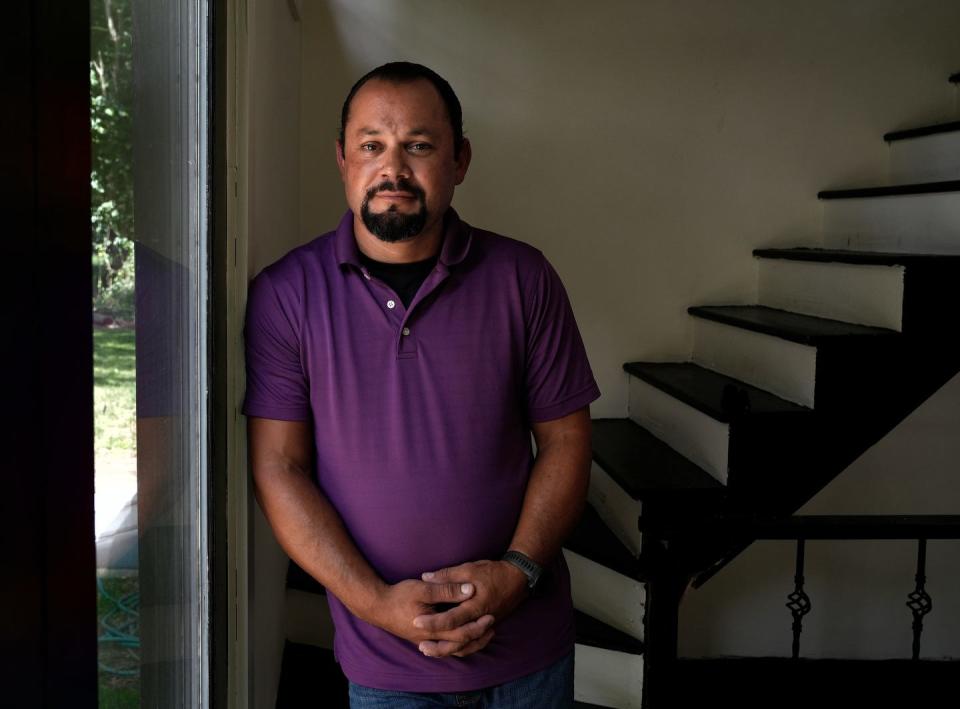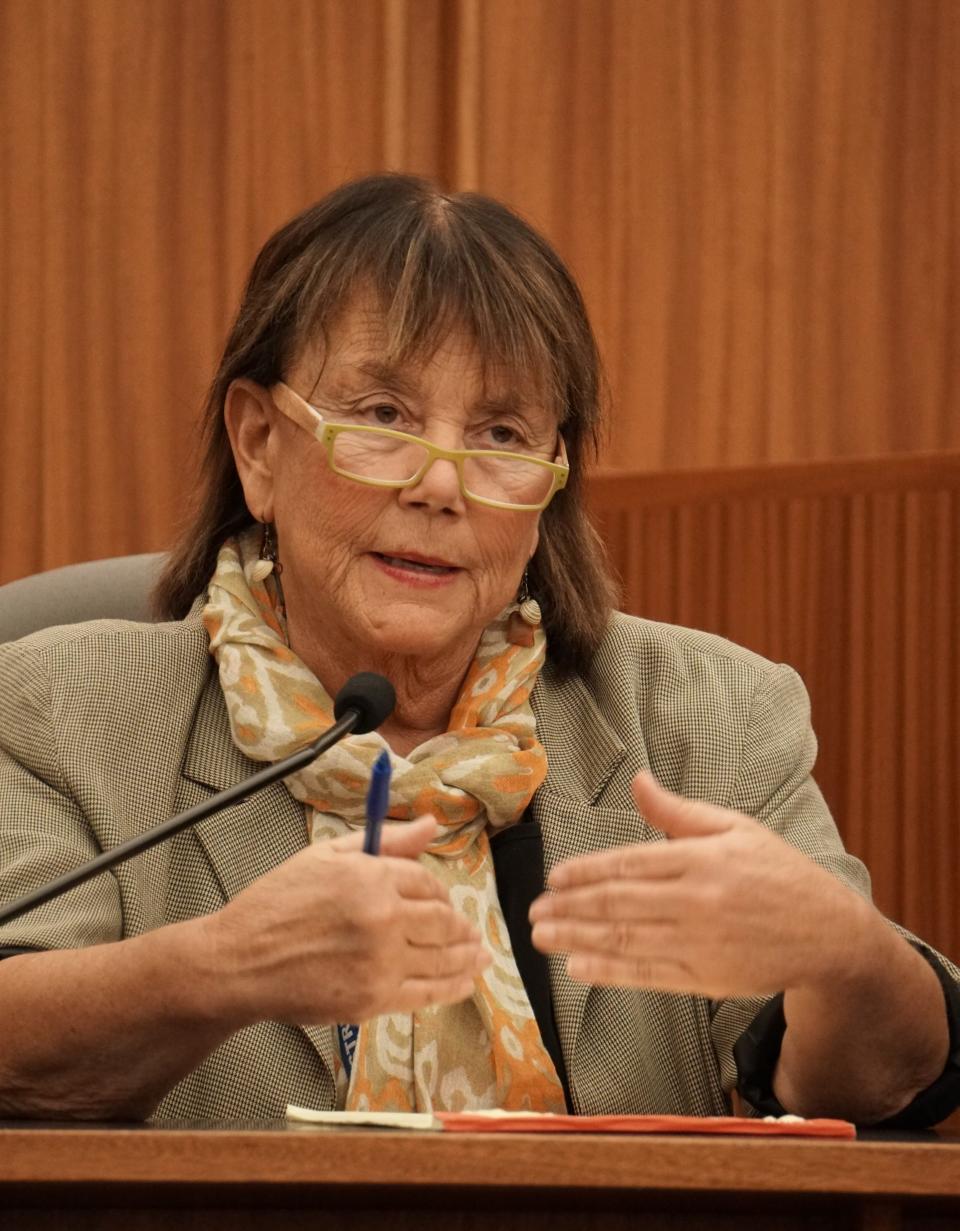Ex-court 'fixer' says he was 'forced' out after stopping side jobs for judge. Now he's suing.
PROVIDENCE – A former state District Court administrator is suing the chief judge and other judicial officials, accusing them of forcing his resignation by creating a hostile work environment and retaliating against him after he reported racist and misogynistic behavior by a colleague.
Nicholas R. Cote on Thursday sued District Court Judge Jeanne E. LaFazia, state Supreme Court Chief Justice Paul A. Suttell, State Court Administrator Julie Hamil, and District Court Administrator Jamie Hainsworth in U.S. District Court alleging they violated his rights under the Family and Medical Leave Act and the state Whistleblower’s Protection Act, among other violations.
The judiciary declined comment Saturday through spokeswoman Lexi Kriss.
"Whenever one stains the noble halls of a courthouse with fiction and fantasy, it is disappointing to say the least. Should he choose to proceed forward, we will have no choice but to defend vigorously and reveal the truth," Michael Colucci said on LaFazia's behalf.
'Never-ending' jobs for judge
Cote worked in District Court as a “fixer” for 21 years, rising to the role of assistant administrator with a $111,185 annual salary due to his hard work, talent and “likeability,” according to the complaint.
He said problems began when LaFazia became chief judge of the court in 2010 and asked him to do work on her homes in Rhode Island and Florida, as he had for other judges. Such projects for LaFazia, he said, “never fully ended” before others were suggested or required to be completed during court hours and on weekends.

Cote accused LaFazia of pressuring him to leave his job as District Court administrator to perform “seemingly never-ending” jobs on her properties while someone filled out his timecards to appear as if he was at work or working from home.
“Fearing reprisals from her and not wanting to immediately jeopardize his six-figure salary, [Cote] continued to serve C.J. LaFazia by performing construction, rehabilitation projects and other 'back-breaking' work at her homes instead of showing up at work for the state District Courts and completing his required tasks,” his lawyer, Kevin Heitke, wrote.
Increasing duties after house fire
In 2021, his rental home burned down, and LaFazia invited him to move into a cottage on her Rhode Island property for “as long as necessary,” the suit says. There was no discussion about payment or work to be performed in exchange.
Within days, Cote resumed projects such as building a deck and working on a pump for LaFazia’s koi pond. Soon, Cote was asked to act as a valet, getting LaFazia’s car inspected during work hours and driving the chief judge to and from work several times a week, the suit says.
LaFazia also ordered him to perform work on her home and rental property in Florida, it says.
According to Cote, he was paid a total of $1,000 over five years and was not reimbursed for materials.
'Dark cloud' over District Court: Ex-admin alleges coverups, dysfunction and retaliation
A lawyer for LaFazia previously described Cote as a close family friend and longtime colleague, whom she tried to help in a time of need by accommodating him until alternate living arrangements could be made. Any work that was done was at Cote's own initiative, he said.
Cote said he requested a leave of absence under the Family and Medical Leave Act after the fire and was granted one, though LaFazia still required him to perform work at her home in Rhode Island. He later learned that only two of every five days during his leave were marked as sick days, he said.
In August 2021, the administrators told him he needed to return to work, despite his rights under the Family and Medical Leave Act. Upon his return, he discovered that his prior responsibilities and duties had been absorbed by other staff, though he continued to draw a $112,000 salary.
Pervasive ‘misogynist, racist and homophobic’ comments by colleague
More problems developed as a result of then superior District Court Administrator Stephen C. Waluk’s pervasive “misogynist, racist and homophobic” comments that became part of the work environment, the suit says.
Waluk previously expressed regret for using “bad words” in communications with Cote.
"It must be stated that many of these allegations are wildly false," Waluk said.
Cote said he brought the “increasingly troubling” problem to LaFazia in 2021, and she convened a meeting in which she encouraged staff to speak freely about their grievances with Waluk. The chief judge reduced Waluk’s pay and supervisory duties for a “short” time, he said.
Courts: More than 150 employees have left the AG's office since 2019. What that means for RI.
Nonetheless, Cote said, he continued to work in a hostile environment with Waluk as his superior with a $13,000 hike in pay, despite the state court administrator being consulted about the toxic District Court atmosphere, the suit says.
The courts only asked for Waluk’s resignation after Cote said he produced continuing emails from the administrator in 2022, some 20 months later, he said.
Disciplinary action followed refusal of 'free labor'
In late April 2022, Cote “mustered enough willpower” to tell LaFazia that he would no longer perform free labor at her homes and would be moving, immediately sparking a new dynamic with the chief judge, the suit says.
Less than three months later, he received his first formal written disciplinary action for “tardiness, excessive absences and general subpar work performance,” the suit says. His responsibilities were diminished and he was told to arrive by 8:15 a.m. each day and was not allowed to leave for appointments. A subordinate began logging his daily activities.

He alleges that LaFazia then began circulating word that he was not of “sound mind” and engaged in illicit drug use. She questioned his heart condition diagnosis.
He received his second write-up in October 2022, both of which he argues were without merit. Waluk and Lorraine Alfonso participated in his discipline, though he had been assured that Waluk would no longer be in a position of authority over him, Cote said.
His salary was reduced from $112,000 in fiscal year 2022 to $43,000 annual. His title was reduced to deputy clerk I. All of his supervisory duties were removed and he was directed to work in Newport instead of in Providence, he said.
More: Confiscated marijuana was key evidence in a civil forfeiture suit. Then, police destroyed it.
Shortly afterward, he was in a serious car crash, leaving him concussed for three weeks. He again requested leave under the Family and Medical Leave Act, but it was not approved by LaFazia.
Despite FMLA protections, judicial officials used his alleged tardiness, absences and adjusted work schedule to discipline and demote him once he stopped working on LaFazia’s house, he said.
The failure of the court to approve his FMLA leave left him vulnerable to firing or causing a constructive resignation, the suit says.
After consulting the union, he was encouraged to resign, amounting to a “constructive” firing without cause, the suit says.
Cote alleges that LaFazia and other court officials retaliated against him for reporting Waluk’s behavior by demoting him to an entry-level position, axing his salary by $70,000, and disseminating false information that he was a “drug addict,” the suit says.
He is seeking back wages, employment benefits and other compensation he lost or was denied as well as unspecified damages.
This article originally appeared on The Providence Journal: Ex-RI District Court administrator sues, alleging retaliation

